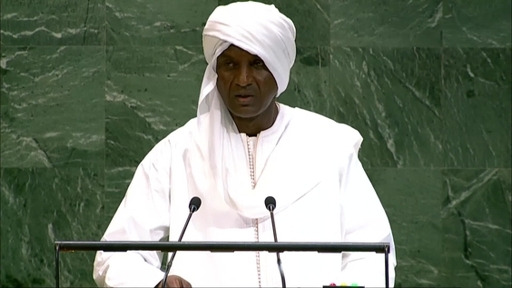At the 80th United Nations General Assembly in New York, Lamine Zeine Ali Mahaman, prime minister of Niger’s Transition Government, delivered a defiant and historic speech that laid bare the aspirations of the Sahel alliance and accused France of orchestrating decades of destabilization in the region.
Zeine began by aligning Niger with the statement delivered the previous day by Malian Prime Minister Abdullah Maïga, who also spoke on behalf of the Alliance of Sahel States (AES) – the political, economic, and defense alliance formed by Niger, Mali, and Burkina Faso in 2023 after they severed ties with ECOWAS. “He forcefully expressed the aspirations of our alliance and our people, with full respect for our sovereignty, the defense of our interests, and genuine cooperation with all countries enamored of peace and justice,” Zeine affirmed.
A Sahelian tradition of unity and solidarity
In the opening section of his address, Zeine reminded the world that Niger and the broader Sahel have long histories of peaceful coexistence. He evoked the ties between diverse communities, Hausa, Zarma, Fulani, Tuareg, Kanuri, Tubu, Arabs, Buduma, who through centuries of intermarriage, kinship, and shared survival in a harsh climate forged deep bonds of solidarity.
“Our people understood very quickly that sticking together, expressing solidarity, is not an option. It was a precondition for their very survival,” he declared, linking this cultural inheritance to the contemporary Sahelian project of regional sovereignty and collective defense.
Condemnation of global double standards
The prime minister sharply criticized the indifference of the international community toward wars and crises in Africa while denouncing Israeli genocide in Gaza and aggression against Iran and Qatar. He also cited ongoing violence in the Democratic Republic of Congo, Sudan, and across the Sahel, arguing that silence and complicity from powerful nations contribute to instability.
He accused certain states of weaponizing disinformation campaigns, financing terrorism, and sowing ethnic conflict as part of a broader strategy to destabilize the region. “This is the reality that my country and the Confederation of Sahel States are facing as we combat imported terrorism backed by sponsors,” he stressed.
Calling out France
The most striking part of Zeine’s speech was his direct calling out of France, Niger’s former colonial power, whose neo-colonial meddling has been a driving factor of the uprisings across the Sahel. He accused Paris of:
Training, arming, and funding terrorist groups after its military expulsion from Niger in 2023.Running disinformation campaigns to discredit Niger’s institutions and leadership.Fueling inter-ethnic tensions and sowing discord with neighboring states.Waging an “economic and financial war” by blocking investment and lobbying international financial institutions against Niger.
Zeine went further, demanding that France acknowledge and atone for its colonial crimes. He recalled massacres committed during France’s violent conquest of Niger in the late 19th and early 20th centuries, from Zinder to Tessawa, where women, children, and entire villages were exterminated.
“In November 2021 in Téra, young demonstrators were assassinated by the French army. And just this year, in March 2025, 44 Muslims were executed in cold blood at Friday prayers. These crimes remind us of those committed ever since 1899,” he said, calling France’s role “abject terrorism behind which it hides.”
He announced that Niger’s transitional authorities had set up a commission of historians and scientists to “rewrite the true history of our country, to reclaim ownership of our history, and to give back to our great nation its dignity.”
Resource sovereignty and economic reforms
Zeine used the global platform to underline Niger’s reclamation of sovereignty over its uranium resources, which for decades supplied France’s nuclear industry while leaving Nigeriens in poverty and environmental devastation. Since July 2023, the ruling National Council for the Safeguard of the Homeland (CNSP) has expelled French companies and sought new partnerships with Russia, China, and Turkey.
Despite sanctions and economic blockades, Zeine highlighted progress:
Inflation reduced to -0.1% by August 2025.Projected GDP growth of 7% between 2025–2028.Reduction of the budget deficit from 5.4% in 2023 to a projected 3% in 2025.Social measures, including lower fuel prices, cheaper school fees, and reduced medical costs.
For the first time, he said, Niger did not experience a “lean season” of food shortages thanks to large-scale irrigation and agroecology programs. “Our ambition is food sovereignty. We will no longer need to ask for support to feed our people,” he declared.
Building the Sahel Confederation
Zeine situated Niger’s transformation within the broader project of the Alliance/Confederation of Sahel States (AES), which is rapidly becoming both a political and military bloc. He framed this as a decisive step in breaking dependency on Western powers and building new forms of solidarity based on “ancestral values, sovereignty, and justice.”
“We will defend our countries to ensure our survival. We will defend our territory and our people,” he vowed, noting that the Sahel fight against terrorism is not only for regional stability but also “for the stability of the entire world.”
Closing his address, Zeine criticized the United Nations as “powerless, hampered by the veto of Western powers.” He called for structural reforms to make the UN Security Council more representative, granting Africa a meaningful role in global decision-making.
The post Niger defends Sahel sovereignty, calls out French colonialism at UNGA appeared first on Peoples Dispatch.
From Peoples Dispatch via this RSS feed


